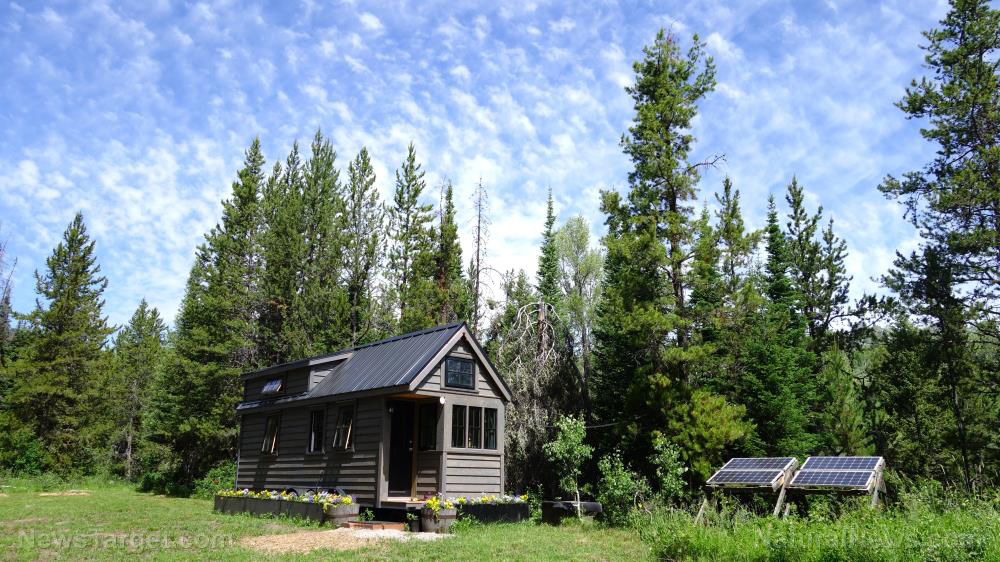Practical tips for living off the grid

(Natural News) Some preppers set their sights on living off-grid to be truly free from the hustle and bustle of city life. But before you go totally off-grid, consider the pros and cons of certain housing situations like living in cabins, on boats, or in recreational vehicles (RVs). (h/t to OffgridSurvival.com)
Cabins
When you talk about off-grid living, most preppers imagine themselves settling down in a cabin in the woods.
Pros
- Having a large enough property means you can live in a quiet and secluded location. (Related: The top 5 prepper-friendly states: Factors to consider before going off grid.)
- It’s easier to start a survival garden.
- You can raise livestock on your property.
- You can set up a renewable power source (e.g., solar energy), fenced in pens for your livestock, and fruit orchards to support yourself.
Cons
- You need to invest in your cabin, especially since livable land isn’t cheap.
- You also need to save up for a well and power generation facilities (e.g., battery banks and solar panels), which can get expensive.
- Since you’re going to be responsible for producing your own food, you need to learn how to hunt, cultivate a garden, and raise animals for food. You can also benefit from learning essential prepping skills like field dressing and food preservation.
While living off-grid requires some investment, it offers many benefits that outweigh most of its drawbacks. If you can afford it, going off-grid in a cabin can be one of the best ways to live a self-sufficient life.
Boats
Boats also come with many benefits and drawbacks.
Sponsored solution from the Health Ranger Store: Lab-verified Nascent Iodine solution is a dietary supplement that provides your body with supplemental iodine to help protect your thyroid during radiation exposure. Nuclear accidents such as Fukushima (or nuclear war) can expose your body to radioactive iodine-131, a dangerous radioisotope. Pre-loading your system with stable iodine occupies the iodine receptor sites on your organs, causing your body to naturally expel radioactive iodine you may have been exposed to through air, food, water or milk products. This defensive strategy is recommended by nearly all health authorities, worldwide, including the Nuclear Regulatory Commission. Discover more at this link.
Pros
- An off-grid boat is fully self-contained.
- You can equip a boat with solar and wind power generation, as well as a battery bank that will cost less than what you would need for a cabin.
- Boats are compact, and it is easier to equip one with an off-grid power system. The internal 12-volt electrical systems on most boats don’t require much power to operate.
Cons
- Boats are mainly restricted by their size, and even large cruising boats can be cramped compared to living on land.
- Boats will significantly limit the supplies that you can store.
- Living off-grid on a boat is associated with certain legal and practical issues. When you live off the grid, you need to keep your distance from a dock or shore facilities.
- You need to anchor out or use a mooring ball. In many jurisdictions, the locations and length of time you can spend anchored out may be restricted by law. In other cases, you may have difficulty securing a mooring.
- To address waste disposal and water storage concerns, use a composting toilet or a portable toilet. Alternatively, you will need to bring your boat to a pump out facility on a regular basis to drain waste tanks and get more fresh water.
- Comfort and safety is another concern, especially during storms.
Preppers who want to live a nomadic life will enjoy the benefits of living off-grid on a boat, as long as you have a good vessel and a secure mooring setup.
RVs
Living in an RV combines the pros and cons of both cabins and boats. However, prepping in an RV also comes with unique drawbacks.
Off-grid RVs can be grouped into two categories: motorhomes and towable RVs (e.g., fifth wheel campers or travel trailers).
Pros
- Take advantage of the self-contained nature of an RV to turn it into an off-grid living option. RVs have an edge over boats since the former operate on land and they aren’t affected by the safety and operational issues that apply to watercrafts.
- A standalone motorhome doesn’t require a tow vehicle so you can drive it to your destination. Motorhomes often come with onboard generators, a battery bank, water and waste storage, and all the miniaturized comforts of a house.
- With a towed RV, you can set up your off-grid home wherever you want. At the same time, you have a vehicle to drive around in, minus a travel trailer.
- Getting a new RV or keeping your vehicle properly maintained will help address common concerns like durability.
Cons
- A lot of trailers and fifth wheel campers don’t come with some of the features of motorhomes such as onboard generators.
- It can be difficult to keep an RV warm and comfortable in cold weather. You need to weatherproof your RV if you’re not in a temperate climate.
- It’s easier to stay cool in an RV in hot weather if you have a good air conditioner, but this turns your vehicle into an energy hog. This can be a problem if you’re off-grid.
- RVs wear out faster, and you will often need to watch out for problems like plumbing leaks and worn out moving parts.
Once you decide on an RV, you can park it on your own property. With a septic tank and well, you can address your water and waste concerns. Use solar panels, wind generators, or portable generators for all your energy needs.
Considerations for living off-grid
When you go off the grid, you have to compromise on certain aspects of daily life. You also have to do other tasks like generating your own power and dealing with sanitation. In some cases, this means using less energy, other times, you may need to work harder to accomplish certain tasks.
Consider where you’re going to settle down. Make sure your intended destination will be suited to your chosen mode of off-grid housing.
Factor in your skill level and budget when determining your off-grid lifestyle. If you’re single, it’s easier to settle down on a boat. If you have a large family, it may be better to live in a cabin.
Plan ahead, set realistic expectations, and work hard to achieve your dream of living a self-sufficient off-grid life in a cabin, boat, or an RV.
Sources include:



